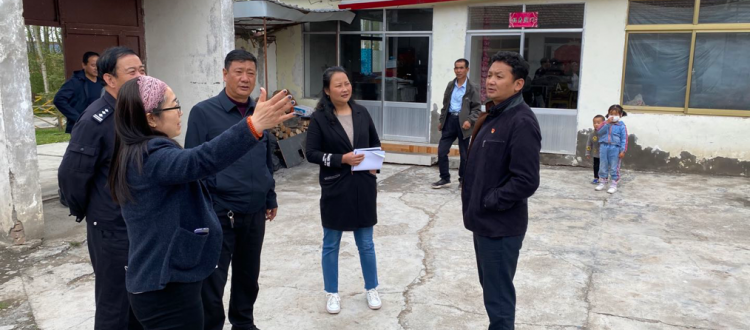Exploring a New Model of “Village Two Committees + Ecological Service-Oriented Economy” in Qilian Mountain
In 2019, at the invitation of the Qilian Mountain National Park Administration, GEI co-launched the “Development of the Communities around Qilian Mountain National Park” demonstration project. We carried out a survey of the national park’s surrounding community and selected Laolongwan Village and Guomi Village as the demonstration sites of the ecological service economy part of the project. We then organized experts to investigate and study the economic status and tourism resources of the two communities and to formulate ecological tourism resource planning.
On the morning of June 6, 2020, GEI was invited to participate in the Qilian Mountain National Park Gateway Rural Development Planning Promotion Conference, held by the Qinghai Provincial Administration of Qilian Mountain National Park. The meeting comprehensively summarized and analyzed the research results of the “Two Village Committees + Ecological Service-Oriented Economy” study and further examined and improved upon the development and construction plans for the park gateway villages. GEI program officer Kong Linghong gave a detailed introduction to the ecological tourism development ideas, activity planning, rural governance, route design, and specific implementation measures for the pilot villages. The discussion at the meeting included official representatives from the Qinghai Provincial Administration of Qilian Mountain National Park.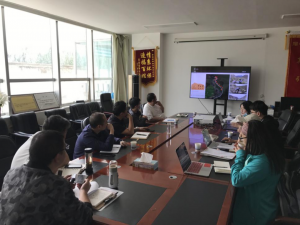
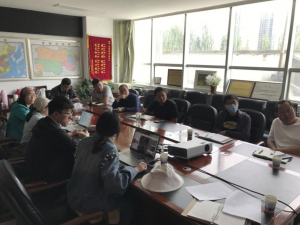
Other important topics discussed at the June 6 meeting included how to promote the implementation of ecological service-oriented economic theory and practical research. The feasibility, rationality, and policy compliance of the gateway rural tourism planning program were also highlighted as issues to take into consideration. The meeting emphasized that carrying out the economic research for “Village Two Committees + Ecological Service-Oriented Economy” was important for the implementation of the Qilian Mountain National Park System Pilot Program. Participants also discussed how the specific practice of “exploring a new model of coordinated development of ecological protection and people’s livelihood improvement” must be based on the local area’s current situation. It is also necessary to focus on the long-term and to truly create new and innovative models for the coordinated development of ecological protection and people’s livelihood improvement.
Specifically, the following requirements need to be met:
- Make the context and branding clear: The design of the plan should focus on national park image display, highlight the characteristics of the national park, and create a unique Qilian Mountain National Park gateway community;
- Give priority to conservation: While exploring the development of locals’ livelihoods, we must adhere to the priority of conservation. The plan must fully consider environmental factors to ensure that ecotourism planning is carried out without damaging the national park ecosystem and natural environment;
- Be practical about expectations for project execution: In terms of how to create and increase income, ensure a positive ecological outcome, allocate the investment and income ratio of demonstration project households, and coordinate and resolve disputes between the indigenous residents and the national park community during the construction process, practicality is key–it is essential to formulate specific solutions to truly benefit the people living in the Qilian Mountain vicinity;
- Pay close attention to ecological and cultural values: Continue to dig deep into the potential cultural characteristics of national parks, transform invisible treasures into visible benefits, and develop and perpetuate local culture while forming distinctive cultural products;
- Cooperate with all relevant parties and employ relevant policy frameworks: Make full use of policies such as targeted poverty alleviation and rural revitalization, channel large-scale enterprises, well-known media, volunteers, and other civil society forces to resolve the livelihood issues of locals, via multiple channels and methods; gradually promote the transformation of ecological protection benefits into economic development. With the benefit of the locals’ increased livelihoods, achieve the coordinated promotion of conservation and development and the harmonious coexistence of humans and nature.
In order to further improve performance and information gathering for “Village Two Committees +” and strengthen communication between the villages of Qilian Mountain, the Office of Qinghai Provincial Administration Bureau of Qilian Mountain National Park has established the “Village Two Committees +” Baoxiang Village-Village Joint Construction Mechanism.
On the afternoon of June 8th, GEI participated in the joint meeting of “Village Committee + Branch” of Qilian Mountain National Park, held in Laolongwan Village, Xitan Township, Menyuan County. During the meeting, local government officials and other participants discussed the research and development of the ecological service-oriented economy. On-site investigations were conducted on the work of the “Two Village Committees +,” and the opinions and suggestions of village cadres and village representatives were presented. Qilian Mountain Administration Office, Menyuan Management Sub-Bureau, party committee members of the Xitan Township Government, the secretary of the branch of Laolongwan Village, the first secretary of the village (representative of party members), all management staff of Laolongwan Management Station, and GEI representative Kong Linghong attended the meeting.
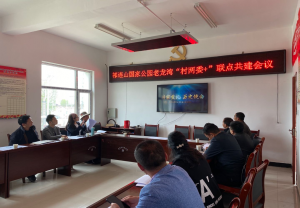
The meeting’s participants discussed President Xi Jinping’s thoughts on ecological civilization and the content of the instructions given by the provincial party committee and provincial government leaders of Qilian Mountain National Park. Relevant members of the party branch of Qilian Mountain laid out the basic context of their branch, the highlights of their work, and the specific content of the “Village Two Committees +” leading Baoxiang and departmental village work system. THe Menyuan Management Branch Bureau, the Party Committee of Xitan Township Government, and relevant members of the Party Branch of Laolongwan Village gave an explanation of the “Village Two Committees +” plan in relation to the joint construction of the branch, villagers’ production and life, regional culture, folk customs, ecological poverty alleviation, community participation, and natural experience. It also carried out in-depth exchanges and discussions on the development of rural ecotourism, the exploration of local folk culture, the development of nature education, and the development of an ecological service-oriented economy.
Deputy Director Duojie emphasized the work of “Village Two Committees+” as an active exploration and bold attempt toward community participation in a pilot of the national park system. The main purposes of this symposium were to solicit the opinions of all parties in the village on the project, unite their ideas, and to jointly explore new models and new paths for the coordinated development of ecological protection and people’s livelihood improvement. The Menyuan Management Sub-bureau plans to work to strengthen coordination, communication, and cooperation between the two village committees and to strive to build up two teams for protection and promotion of the project. It also aims to continue to strengthen the national park brand effect, strive for financial support from all sides, strengthen the intensity of job-transfer training, and create a new path in the “Village Two Committees +” work, in order to generate high quality results.
GEI will combine the characteristics of Liandian Village and the construction and development requirements of Qilian Mountain National Park to form a feasible work plan as soon as possible. We will work together with all parties to systematically plan the “Village Two Committees +” working model to continue advancing and perfecting the project’s development. Looking ahead, we aim to strengthen coordination, make full use of policies such as targeted poverty alleviation and rural revitalization, and focus on addressing locals’ livelihood issues in pilot villages. We also recognize that during this stage it is important to make sure that the benefits of ecological protection are more quickly translated into benefits for economic development and local people’s well-being, so as to achieve coordinated progress in protection and development and harmony between man and nature.
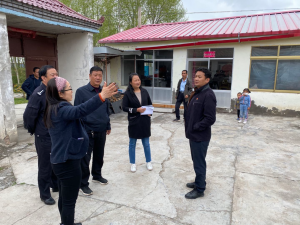
In the next step of the project development process, GEI will continue to cooperate with the Qinghai Provincial Administration Bureau of Qilian Mountain National Park and accelerate the research and exploration of ecological service economy. Throughout this process, we will keep in close contact with relevant departments, townships, and villages in order to fully implement the cooperation objectives, content, and methods. Through continuing to jointly explore the possibilities that the “Village Two Committees +” working model holds, we aim to achieve innovative results in the process of building a national park gateway village.

